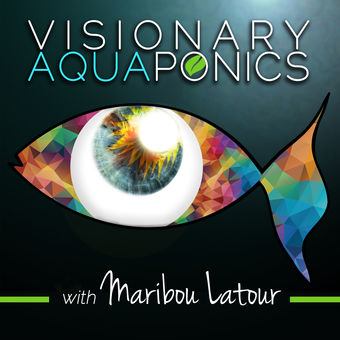
Visionary Aquaponics with Maribou Latour
Maribou Latour
Visionary Aquaponics is a podcast created for you, the Aquaponics Entrepreneur, the Aquapreneur, and those who want to take their Aquaponics to the next level. This show delivers 3 episodes a week for you Aquapreneurs who want to learn more about the business side of Aquaponics. Each episode brings you a different Aquaponics expert with advice on various topics from backyard to commercial Aquaponics, passive solar design, integrated aquaculture, renewable energy, biochar, horticulture, fish breeding, organic hydroponics, farm design, systems thinking, the failures and successes of Aquaponics businesses, earth-sheltered greenhouses, and permaculture-integrated Aquaponics. We end each show with inspiration for future research and development, and the #1 tip for the Aquaponics entrepreneur.
- 57 minutes 22 seconds56: Natural Pest Sprays and Dual Root Zone Aquaponics with Reid Larson of PolyGuarden
Today's guest is Reid Larson, founder and chief science officer of PolyGuarden, a company offering full-spectrum protection for both residential and commercial aquaponics with the mission of global implementation of aquaponics.
Listen in as Reid talks about the products and services they're offering including eco-friendly pest sprays, proactive vs. reactive pest sprays, and Solution 3 plant supplements for root development. Reid further discusses neem extractions and dual root zone aquaponics where you get to plant on soil on top of the aquaponics media. Find out about certain products to stay away from, the use of macro and micronutrients, the need for water changes, and dealing with problems of readily available nutrients.
PolyGuarden has opened up consulting, designing, and monitoring systems. Reid further discusses the Google trends and the power of collaboration. More topics will be discussed including strengthening food systems, various systems they’re using, and some advancements in their monitoring systems.
Finally, Reid shares his insights into the best integration between aquaponics and permaculture with a touch on land restoration soil remediation.
16 December 2015, 7:50 pm - 58 minutes 26 seconds55: From Becoming Food Aware to Commercial Aquaponics with Steve Carrell of Ponderosa Aqua Farm in Indiana
In this episode, Steve Carrell, co-owner of Ponderosa Aqua Farm shares with us highly valuable information on setting up a commercial aquaponics system. Steve owns a construction company while his wife, Missy, is a long-time gardener. A dynamic duo, together they formed the Ponderosa Aqua Farm based in Spencer, Indiana. It was at that time when they started to question what's in their own food that sprung out their decision of living off of only what they ate. Transitioning from an in-home basement system to a commercial system, they went to Florida to attend the course at Green Acre Aquaponics.
While many commercial aquaponics growers recommend to start small, Steve takes the opposite direction believing that you have to have a certain scale in order to sell enough produce in order to be profitable. Listen in to what he has to say.
He also discusses things like underestimating the cost of going commercial (can be pretty overwhelming!) including labor and plumbing, the social impact of aquaponics, market research, as well as growing tomatoes, lettuce, and microgreens and dealing with clogged lines that brought death to their strawberries.
Steve talks about observing fish habits to know if your system is okay and discovering problems along the way. Other points of interest include gravity flow system, swirl filters, mineralization tanks, grow beds, as well as a look into their commercial system consisting mainly of deep water culture raft beds.
We also touch on heating issues, buying the greenhouse from Craigslist, and grow towers which they got from Green River Greenhouses in Indiana. Steve delves more into dutch buckets systems and how they actually work.
14 December 2015, 10:34 pm - 49 minutes 45 seconds54: Bringing Aquaponics to the Classroom with Michael Kosko of Al Raby School for Community and Environment
Today’s episode features an inspiring guest, Michael Kosko, a Science teacher at Al Raby School for Community and Environment in Chicago, Illinois. I got him on the show after being inspired by the article he was featured on, From Aquaponics to Robots: McCarthey Dressman Education Foundation disperses over 149,000 for school enrichment in the US and Sudan.
Michael has been teaching in Chicago public schools for nine years now. He currently focuses on teaching environmental science to freshmen and exploring it together for the past years. Receiving the McCarthey Dressman grant gives them the opportunity to expand the program and support their Career in Technical Education programs, specifically culinary arts, emulating a lab-to-table model where students grow their own food sustainably, learn how to prepare it, and eventually selling it in partnership with their Business Career in Technical Education program. They are the first school to combine horticulture and culinary model together in their programs,
Listen in as we discuss topics like nitrogen cycle education, instilling a love of science, and how his students are occasionally flooding the classroom. We also talk about bell siphons, classroom aquaponic units made from IKEA stands, plans for media beds and and systems cost.
We touch on things like system failures, filtration methods, and water testing as well as cycling duration and methods. Michael discusses business programs including business planning and marketing and integrating into the horticulture program and his love for science and kids! Lastly, get loads of information on bringing aquaponics in the classroom through funding and grants.
11 December 2015, 9:46 pm - 51 minutes 42 seconds53: Bringing Aquaponics to New Zealand Schools~ Diana Fitzsimmons & Amanda Jones from Wairakei Primary School, New Zealand
This is a fun episode as we chat with Diana Fitzsimmons and Amanda Jones from Wairakei Primary School in New Zealand, along with two of their students, Myles and Rose. Listen in as they talk about how they got into doing aquaponics, dealing with fish death, experimenting systems, getting ideas from Murray Hallam, and building an in-line system composed of media beds and clay beds.
They also touch on more related topics such as insulating tanks, solar water heating, and water testing using test tubes. Check out how they dealt with nitrite spikes and staying away from fish death.
Our guests today share about the teaching system in New Zealand, specifically focusing on aquaponics and how it addresses global issues where they intend to fit the aquaponic system setup into New Zealand's curriculum considering that aquaponics is a very new topic in the country so they hope to expand the knowledge on aquaponics throughout New Zealand.
More discussion on system maintenance during school breaks, the role of bacteria as the unseen good guys, as well as growing fish and experimenting things like raising eels, prawn, shrimps, and crayfish. Lastly, we talk about dealing with regulations, laws, and restrictions involving aquaponics.
30 November 2015, 7:50 pm - 1 hour 5 minutes52: A Smokeless Burn-Creating Biochar with TLUD Stoves w/ Spencer Curry of FRESH Farm Aquaponics
This episode couldn't get any hotter as we welcome back Spencer Curry of FRESH Farm Aquaponics on the show. Listen in as he discusses TLUD stoves and all about the smokeless, double burn which is simply genius!
TLUD stands for Top-Lit Updraft Stove. Today's show is primarily on biochar, why TLUD stoves rock, and how to make one. We’re talking about TLUD stoves made out of paint cans, the concept of pyrolysis, the role of an oxygenless chamber, and creating biochar with tons of surface area for microbial habitat (whether you use biochar for aquaponics or soil). We also talk about how biochar works to adsorb nutrients and how that differs from absorption.
Listen in as Spencer comprehensively describes how a TLUD stove works, as well as some techniques to make it work properly. Other things included in the interview are rocket stoves vs. rocket mass heaters, liquid heat, chimneys, cinder blocks, how the combustion process works for the gases, and siphoning gas over combustion.
We also delve into the downsides of the TLUD stove, the cost of building it, eliminating contamination issues with pyrolysis, some various tests to check once everything is done, and observing safety measures. Get more biochar application tips from Spencer including combination materials and mixes, plants that like biochar and some pH changes with biochar.
Lastly, we touch on systems design including the use of biofilters, swirl filters, and pumps in deep water culture and vertical tower NFT systems.
25 November 2015, 6:52 pm - 1 hour 7 minutes51: Fostering a Sustainable Food & Aquaponics Movement in Egypt w/ Faris Farrag of Bustan Aquaponics
In today's episode, we welcome Faris Farrag of Bustan Aquaponics who is stirring up an aquaponics movement in Egypt. A former banker turned aquapreneur, Faris is pioneering a movement in aquaponics while hoping to see a rising movement in the rest of the Middle East and North Africa (MENA) region. His interest in aquaculture and food has led him to enroll at Dr. James Rakocy's course in the University of the Virgin Islands which further inspired him to stay in Egypt and break ground on the farm that he currently has today.
Listen in as Faris talks about the different produce they're growing in the system, how the market has responded to their aquaponic system, and keeping up with the momentum. Faris also brings into our discussion the ins and outs of organic certifications as well as reclaiming the language by putting the responsibility on producers using chemical products. We delve into the biggest issue concerning re-circulating fish farms and how to deal with it using biofiltration systems.
Faris describes the organic food movement in Africa in terms of traceability, the current trends affected by water scarcity, and a look into their permaculture-integrated farming, net-zero waste through efficient reuse and recycling of everything in the system through an amazing deep irrigation network
We also talk about renewable energies, passive solar water heaters, and heat diffusion system as well as the solar desalination process and purification through mirroring. Faris gives a comprehensive description of their actual UVI-based aquaponics system while using 80-90% less water than more traditionally land-based agriculture as a water-based system in the desert.
More topics on sand as excellent base media and composting, the need for integrating technology into natural farming systems, genetic modification and localizing seeds, sustainable fishing and value-added products, and having an al fresco dinner at Faris' pop-up restaurant which is just super cool!
Lastly, we talk about the marketing and the financial side of the business covering intellectual property design systems and online delivery service in Egypt. Really listen into some solid marketing and financial planning strategies and the importance of localizing the food movement amidst the challenges of logistics and bureaucracies.
19 November 2015, 5:49 am - 49 minutes 6 seconds50: Urban Aquaponics in Brooklyn, NY, with Yemi Amu of Oko Farms
Celebrating Episode 50!!! Creating a flourishing green space amidst busy Brooklyn, New York is just what Yemi Amu, co-founder of Oko Farms has successfully created. Established in 2012, Oko Farms is a commercial aquaponics and educational company. Its current biggest project is called the Moore Street Farm in Bushwick, a 2,500 sq.ft. farm where they raise a variety of fish such as channel catfish, tilapia, and goldfish as well as herbs like basil, shiso, mint, cilantro, and more and where they sell mostly to neighborhood restaurants. Education-wise, they have built solid partnerships with the Department of Education through a program that connects public school children to farms around the city as well as a partnership with a nonprofit housing developer, Northeast Brooklyn Housing Development Corporation.
Listen in as Yemi talks about her training with Morning Star Fishermen. Yemi illustrates their aquaponics system, initially growing plants in coir and later transferring them to rockwool as their growing media. Learn more about how Oko Farms is dealing with downy mildew issues through different techniques such as foliar spraying with compost tea. Other plants they’re growing include mint and the Japanese-herb shiso.
On the business side of things, Yemi talks about marketing and getting started in business with aquaponics, how they started small and getting funding through partnerships with different entities such as the Brooklyn Economic Development Corporation, Green Thumb, Home Depot, Build It Green, New York Restoration Project, and The Awesome Foundation.
Lastly, Yemi touches on creating value-added products, licensing (they actually only make products that don't require licenses), what products fall under the 20-C exemptions, and the value of developing relationships in the community to reduce your need for getting loans.
6 November 2015, 1:00 pm - 47 minutes 15 seconds49: How Vertical Farming & Live Sales Can Transform the World of Food Distribution & Reduce Waste w/ Dr. Nate Storey from Bright Agrotech
This is Part 2 of the interview with Dr. Nate Storey of Bright Agrotech, makers of the ZipGrow Towers. In this episode, Nate talks about the big impediments to newbie vertical farmers and why Upstart Farmers was conceived. He also talks about the UpStart University, a learning-based community that offers video courses to self-driven students as well as the Jumpstart Farmers Program, which offers entry-level mentorship. Nate briefly discusses the different courses they offer at the UpStart University including organic certification, lighting courses, business planning, and marketing.
Listen in to know more about farm planning & financing, grants, Kiva loans, and how much would you exactly need to get started. Learn about the importance of understanding your market and how to go through the planning process. Nate explains why ZipGrow towers are an answer to issues concerning live sales, robust farming, and light conservation. Check out why they also reduce smog in cities!
Dr. Nate further emphasizes the importance of understanding the money value of sunlight, addressing some light limitations, understanding the value of indoor growing based on local markets, and how LEDs can be cost-effective over time. Lastly, we talk about the role of live sales in food distribution and waste reduction, and why live sales totally rock!
21 October 2015, 11:57 pm - 45 minutes 28 seconds48: Food Sovereignty, Social Entrepreneurship, & Building a Growasis Permaculture Farm with Adam Brock of GrowHaus
Adam Brock is the co-founder of GrowHaus, a unique nonprofit based in Denver, Colorado. GrowHaus is a half-acre space encompassing different aspects of the food system under one roof including food production, food distribution, and food education, with a focus on revitalizing their local community through rebuilding food sovereignty.
Tune in to this episode as Adam takes us through the four-year process of building this unique community by connecting with the neighborhood as well as the different classes they have developed over time-- including Seed to Seed summer program for teens, micro business training, service learning, and even permaculture classes to the general public.
Adam walks us through the GrowHaus business model - its structure, the mission, and the funding of nonprofits. He gives us a brighter perspective on social entrepreneurship that combines non-profits & for-profits, in a non-traditional "regenerative" legal structure. Adam also describes the actual systems at the GrowHaus including a hydroponics farm, an aquaponics farm based on the UVI model of deep water culture system (DWC, or raft), and some of the crops they're growing, including a mini food forest with perennials and fruit trees.
Learn more about topics including the permaculture paradigm as key to their success, GrowHaus' community demographics, getting help from "cultural translators," and the permaculture application into their systems - the "Growasis," a tropical food forest, and a mushroom facility. Other things mentioned are the Permaculture Design Magazine, fertigation, and intersecting aquaponics with the food justice and permaculture movements as a powerful tool for food sovereignty.
A highly viable aquaponic setting right in the middle of the most polluted zip code in the entire state of Colorado - How has GrowHaus been able to successfully do this? Let's find out!
21 October 2015, 6:19 am - 49 minutes 3 seconds47: More on Science-based Systems & Commercial Aquaponics with Rebecca Nelson of Nelson and Pade
This is part 2 of the interview with Rebecca Nelson, co-founder of Nelson and Pade based in Wisconsin.
Nelson and Pade is currently working with the University of Wisconsin at the Aquaponics Innovation Center funded through an economic development grant to build a center for research. Along with Dr. Chris Hartleb of the University of Wisconsin - Stevens Point (UWSP), they have developed a university level aquaponics course which is now running on its fifth year.
Listen in as Rebecca shares more about growing tilapia and walleye fish in their commercial systems as well as leafy crops, tomatoes, peppers, cabbage, beets, cucumbers, and more! They grow tropical fruit trees too like bananas, limes, pomegranates, papaya.
Discover the challenges in designing aquaponic systems and growing an aquaponic business - combating misinformation and building your business upon validated research. Rebecca also shares some tips for successful commercial aquaponic farming including good business planning and understanding controlled environment agriculture as well as avenues you can take to get funding. Other topics include USDA regulation, Certified Naturally Grown, dealing with government permits, laws, and regulations, and things that curtail aquaponics as a viable business option.
16 October 2015, 5:10 pm - 45 minutes 49 seconds46: Managing an Aquaponics Homestead with Jennifer Boren of Noga Farms
Today's guest is Jennifer Boren of Noga Farms in Gordonville, Texas. A nurse by profession, she decided to be a stay-at-home mom to take care of her four beautiful children. Initially building their system from some recycled oil-filled equipment, she shares with us what they've done wrong with their first aquaponics system and how they fixed the issues along the way.
Listen in as Jennifer talks more about gravity-fed systems, ebb and flow vs. constant flood, using bell siphons vs. standpipes, as well as what's growing in their raft system and pea gravel media system. Discover how Nova Farms is growing peppers, strawberries, micro-greens, red lettuce, tomatoes, beans, eggplants, and edible flowers. Currently, they run an outdoor media system connected to the barn.
She also delves into topics like heat issues, lighting system, oxygen requirement, understanding water hardness or softness, off-gassing chlorine from water, cycling water; and salts and sodas for hardening the water. We also touch on filtration system (bio-bead filter, bird nets, and Matala filters) as well as valves for emergency measures and leakage issues. Lastly, learn about their business model primarily on selling tilapia for pond management.
15 October 2015, 2:20 pm - More Episodes? Get the App
Your feedback is valuable to us. Should you encounter any bugs, glitches, lack of functionality or other problems, please email us on [email protected] or join Moon.FM Telegram Group where you can talk directly to the dev team who are happy to answer any queries.
 Aquaculture and You
Aquaculture and You
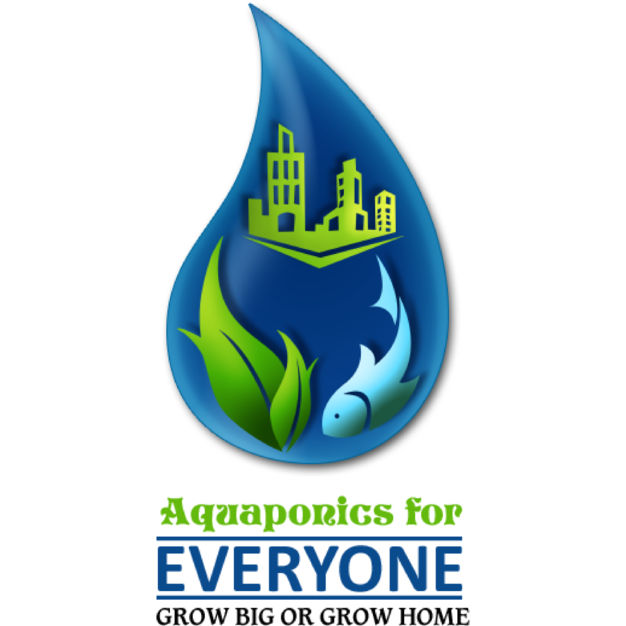 Aquaponics For Everyone
Aquaponics For Everyone
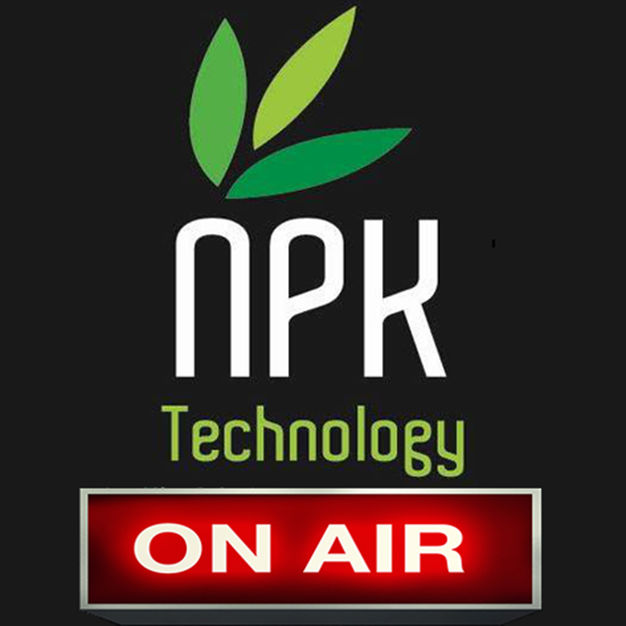 NPK Hydroponics Live
NPK Hydroponics Live
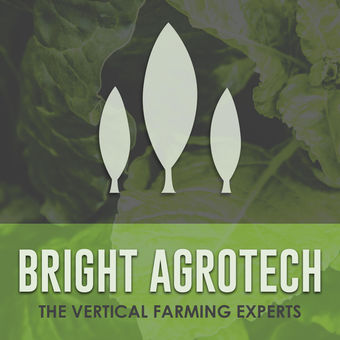 Bright Agrotech Network
Bright Agrotech Network
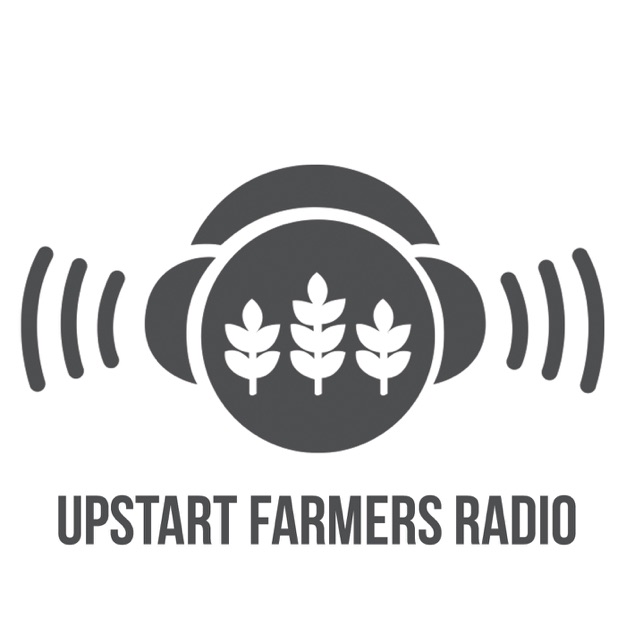 Upstart Farmers Radio
Upstart Farmers Radio